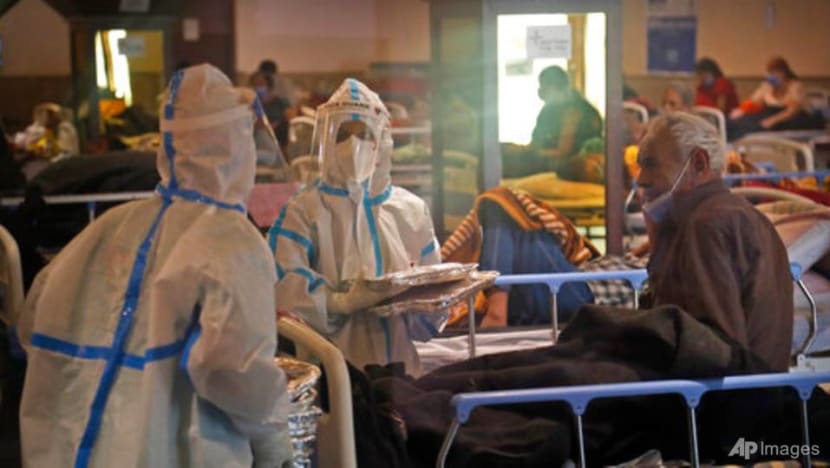India COVID-19 variant: What we know so far

A health worker distributes food packets inside a quarantine centre for COVID-19 patients in New Delhi on Monday, Apr 19, 2021. India's health system is collapsing under the worst surge in coronavirus infections that it has seen so far. (File photo: AP/Manish Swarup)
SINGAPORE: India is battling a record-breaking rise in COVID-19 infections that has overwhelmed hospitals and led to severe bed and oxygen shortages.
A key question is whether a new variant with potentially worrying mutations - B1617 - is behind what is currently the world's fastest-growing outbreak, which added more than 300,000 fresh infections on Thursday (Apr 22).
The B1617 variant has already appeared elsewhere, including in Singapore, the United States, Australia and Israel. Concern about it has led some countries, including Singapore and the United Kingdom, to slap travel restrictions on India.
Here's what we know about the variant so far:
IT'S A "DOUBLE MUTANT"
Viruses change all the time and the one that causes COVID-19 has already undergone several thousand mutations - some more concerning than others.
India first reported the B1617 genome to the global database (GISAID) in October.
Described by officials as a "double mutant", it was first reported on Mar 24, when it had been found in more than 200 samples in the hard-hit western state of Maharashtra.
At the time, India's health ministry said that it appeared in 15 per cent to 20 per cent of samples analysed in the state. More recently, the figure was 60 per cent.
The variant has also been detected in 18 other countries as of this month, according to GISAID.
Epidemiologists said the term "double mutant" refers to an entirely new variant that has the characteristics of two already identified variants. In the case of B1617, these are the E484Q and L452R mutations.
"Double mutant is not a scientific term. It is just another mutant which seems to be unique to India," Ramanan Laxminarayan, the founder of the Center for Disease Dynamics, Economics & Policy in New Delhi, said in March.
The E484Q mutation is similar to another - E484K or sometimes nicknamed "Eek" - observed in the South African, Brazilian and, more recently, the UK variants.
The Eek has been dubbed an "escape mutation" as it helps the virus get past the body's immune system.
The L452R mutation was found by a Californian study to be an efficient spreader.
Scientists say more evidence is needed to determine if these mutations make the B1617 variant more dangerous.
B1617 has been categorised by the World Health Organization (WHO) as a "variant of interest".
Other variants detected in Brazil, South Africa and the UK have been categorised as "of concern", because they are more transmissible, virulent or might reduce antibody efficacy.
The WHO last Friday said that it is monitoring the variant, and the agency’s technical lead Dr Maria Van Kerkhove described it as “concerning”.
“Having two of these mutations, which have been seen in other variants around the world, are concerning because there’s a similarity in these mutations that confer increased transmissibility, for example,” she said.
“Some of these mutations result in reduced neutralisation which may have an impact on our counter measures, including the vaccines.”
READ: India records world's biggest single-day rise in COVID-19 cases
READ: Oxygen supplies run low as India grapples with COVID-19 'storm'
THERE IS A LACK OF DATA ON THE VARIANT
Rakesh Mishra, director of the Hyderabad-based Centre for Cellular and Molecular Biology, is one of the scientists currently analysing the B1617 variant.
So far, he says it has been "better in terms of spreading compared to other variants".
"Slowly it will become the more common one and it will replace the other variants," he told AFP.
It is not yet known, however, if India's current wave is linked to this variant, or if it is being driven by human behaviour or something else.
Health experts have raised "super spreader" concerns over recent huge religious festivals and political rallies with mostly maskless crowds.
When the variant was first detected, health officials said that it had not been detected in large enough numbers to link it to the surge in cases in Maharashtra and other Indian states.
At the time, Laxminarayan said: "We have no evidence that these variants are more transmissible or more lethal than what we already have."
Britain, which has detected more than 100 cases of the variant, is investigating it, however they do not have enough evidence to classify it is as a variant of concern, Susan Hopkins of Public Health England said last Sunday.
Speaking on the Andrew Marr Show on BBC television, Hopkins said: "We have not got enough data about this variant yet to be able to clarify whether it's a variant of concern. We have put it as a variant under investigation.
"To escalate it up the ranking we need to know that it's increased transmissibility, increased severity, or vaccine-evading, and we just don't have that yet, but we're looking at the data on a daily basis."
READ: COVID-19 variants inciting India's second surge, epidemiologists say
Commentary: Those new coronavirus variants sure are worrisome
COVID-19 VACCINES ARE PARTIALLY EFFECTIVE AGAINST IT
One of the mutations is related to Eek, which is suspected of reducing antibody protection from a previous infection or vaccination, said University of Utah evolutionary virology researcher, Stephen Goldstein.
Mishra said scientists were testing vaccine efficacy against the variant.
Even so, experts say vaccines still offer some protection, particularly from severe cases.
Israel, which has registered cases of the Indian variant, believes that the Pfizer-BioNTech vaccine is at least partially effective against it.
"The impression is that the Pfizer vaccine has efficacy against it, albeit a reduced efficacy," the health ministry's director-general, Hezi Levy, told Kan public radio on Tuesday.
Speaking at a press briefing on Tuesday, British Prime Minister Boris Johnson said: “We will look very carefully at whether it shows any sign of being able to escape the vaccines or escape the effect of the vaccines, but that's where we are at the moment."
READ: Singapore to stop entry for all long-term pass holders, short-term visitors with recent travel history to India
READ: More than 50 on India flight to Hong Kong test positive for COVID-19
COUNTRIES ARE MOVING TO STOP THE SPREAD OF THE VARIANT
With concerns about the variant, and amid the broader COVID-19 situation in India, a number of countries and territories have implemented restrictions and issued travel advisories.
In Singapore, the Ministry of Health (MOH) announced on Thursday that long-term pass holders and short-term visitors with recent travel history to India within the last 14 days will not be allowed entry into Singapore from Apr 24.
This includes visitors who transit in India, and all who had obtained prior approval for entry into Singapore, he said.
The Health Ministry also announced on Thursday that all travellers with recent travel history to India who have yet to complete their 14-day stay-home notice by 11.59pm on Thursday will need to serve their additional seven-day stay-home notice at dedicated facilities instead of their place of residence.
Describing the new measures as a “temporary freeze” on arrivals from India, Mr Lawrence Wong, co-chair of the COVID-19 multi-ministry task force, said this will give Singapore time to monitor the situation there and better understand the “new variants that are there and the risk that they pose to us”.
The US Centers for Disease Control and Protection has said all travel should be avoided to India, noting that "even fully vaccinated travellers may be at risk for getting and spreading COVID-19 variants".
Britain's Prime Minister Boris Johnson cancelled an official trip to New Delhi that had been scheduled for next week, and his government added India to its travel "red list".
When it banned travel from India this week, the UK specifically cited fears of the new variant.
Hong Kong also suspended flights from India from Tuesday, the same day that the city reported that at least 53 passengers on a flight from New Delhi tested positive for COVID-19.
MORE VARIANTS MAY EMERGE IN INDIA
Since more variants emerge when there are more infected hosts, Mishra said that India needs to get its COVID-19 outbreak under control.
Another variant, the B1618, recently raised red flags when it became the third-most detected in India.
Goldstein pointed to the UK's success at turning around a recent outbreak despite the presence of a more transmissible variant.
"It can be quite onerous, but it can be done," he told AFP.
"I think the vaccination campaign certainly helped ... but it's the lockdown that enabled them to slow the rise of cases and start to turn the corner."
BOOKMARK THIS: Our comprehensive coverage of the coronavirus outbreak and its developments
Download our app or subscribe to our Telegram channel for the latest updates on the coronavirus outbreak: https://cna.asia/telegram












